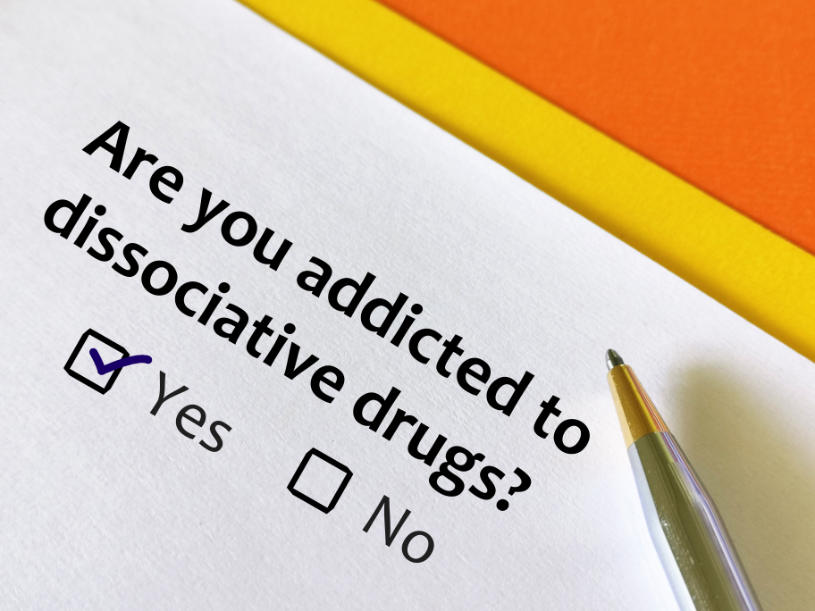Dissociatives, which are also known as dissociative anesthetics, belong to the psychedelic drug group. An individual affected by the drugs of this class experiences disconnection with the surrounding environment, the feeling of separation from the self, and also altered sensory perception.
Table Of Contents:
Even though some people may try these types of drugs to discover a new experience, they should be aware of the possible unpredictable effects dissociative drugs can have on the health and mental state of a person. Some of these effects can include seizures or severe muscle contractions, aggressiveness or violent behavior, anxiety and depression like symptoms.
If one still wonders what is a dissociative drug and what dissociative drug effects are, there is a broad answer to this question.

What Is A Dissociative Drug?
Dissociatives drugs list can be divided into two categories: legal and illegal. The first ones are used as anesthetics or cough and cold medications, while the second ones are related to abuse. Both of them are referred to the hallucinogenic drug class.
Some of the most common examples of these drugs include Ketamine, Dextromethorphan (DXM), Nitrous Oxide, Salvia divinorum, and Phencyclidine (PCP). Out of this list of dissociative drugs, PCP is illegal, while Salvia divinorum is banned on the federal level in more than half of the US counties. As for Ketamine, DXM, and Nitrous Oxide, these are legal anesthetics.
Here is what one should know about the mentioned substances in a nutshell, so the dissociatives drugs list is as following:
- Ketamine is an anesthetic that is widely used in both veterinary and surgery. If taken in low doses, Ketamine creates stimulant effects, while medium and high doses are likely to produce an out-of-body experience and may cause amnesia.
- PCP is an illegal drug with hallucinogenic and dissociative effects. Interestingly, the second name for PCP is ‘angel dust’ due to the effects it produces: it makes one experience the feeling of body detachment, a state of trance.
- DXM is considered to be a safe drug which is mostly used as cold and cough medication. As DXM is a cough suppressant, it is sold in the form of a tablet, spray, and lozenge.
- Nitrous Oxide is a legal dissociative anesthetic. Many may know it as a laughing gas which creates a dissociation effect so that one experiences a detachment from mind and body. Rarely, visual hallucinations occur.
- Salvia divinorum, a mint plant, that belongs to the sage family. People use Salvia as a recreational drug. Since this drug affects the way one thinks, acts, and perceives the world, Salvia is prohibited in some states.
Considering the possible dissociative effects, some people may use them to experience a state of euphoria. However, abusing dissociatives may cause discomfort or panic-related states as well as lead to mental disorders and psychological dependence.
How Do Dissociative Drugs Work?
For a better understanding of how dissociatives work, one should imagine the entire process as signal blockage. Specifically, such drugs block out the signals sent by diverse parts of the brain to the conscious mind. It is worthy of mentioning that dissociatives also affect an important neurotransmitter – glutamate – which is critical for cognitive function, perception of pain, and emotions.
The best thing to have a positive experience with the drugs under consideration is to learn more about how dissociatives work. Because such drugs also impact glutamate, some people may experience pain relief, while others have hallucinations and experience trance states to a certain extent. If nerve cells do not release enough of glutamate or, on the contrary, release more glutamate than needed, the effect of a particular drug would differ as well.
Dissociative drugs belong to the class of hallucinogens and also share some effects with the common representatives of that class. There are risks of addiction to the common dissociatives as well as an overdose on them. For that reason, knowing the symptoms, one can start rehabilitation before the problem becomes too serious.
Dissociatives vs Psychedelics: What Is The Difference?
The psychedelic drug category unites three groups, namely, cannabinoids, serotonergics, and also empathogens. The reason why all these groups belong to one category is due to the fact that their consumption results in some unfamiliar states of consciousness. As a comparison, dissociatives produce some magnified states of consciousness which are, nevertheless, familiar to a person. Psychedelics modify cognition working against the serotonin receptors.
Dissociative drug effects in comparison with psychedelics have the following manifestations:
- detachment from the body and world
- depersonalization
- derealization of the surrounding environment
Psychedelics effects establish themselves in the following conditions:
- cannabinoids produce some light euphoria, stimulate hunger, improve one’s well-being in general, others may slightly alter the current processes of the linear memory
- empathogens produce euphoria, hyper-sensory experiences, elevated feelings of openness, and love
- serotonergics produce intense modifications of perception, specifically, synesthesia, unfamiliar and new emotional responses, and also hallucinations both auditory and visual
In such a way, despite some similarities between the effects of dissociatives and psychedelics, there are some profound differences as well. Besides, it is crucial that psychedelics produce many effects even when the dosages are not large, unlike with dissociative hallucinogens.
Dissociative Drug Effects on The Body
There are short-term and long-term effects of dissociative drugs on health. Despite the duration of the effects, the principle of drug’s work is always the same – the disruption of the glutamate activity concerning NMDA receptors. Below, there are major differences between dissociative effects in the context of their duration.
Short-Term Dissociative Effects
Dissociative drug effects may result in feelings of dissociation from the self and the environment, floating feeling, and also causes visual, as well as auditory distortions. Also, one can experience such dissociative effects as:
- anxiety
- amnesia
- numbness
- body tremors
These effects directly depend on the dosage and the user’s perception of the drug. The side effects named above are considered to be the general ones. At the same time, however, some effects may be rather dangerous and characterize a particular drug in this class.
Drug-Specific Short-Term Side Effects Of Dissociatives
| PCP | Taking high doses of PCP results in the following effects: strong seizures, unexplained aggressiveness, and psychotic symptoms similar to those experienced by people with schizophrenia. |
| KETAMINE | For Ketamine, the effects after a moderate to high dosage include amnesia, sedative state, and immobility. If the dose is high, one may face a severe sensory detachment which reminds of a near-death experience. |
| SALVIA | In the case of Salvia, some users experience short-term effects like intense mood swings. |
| DXM | When the doses of this dissociative are high and go beyond the recommended amount, adverse reactions occur. For example, disruption of the cardiovascular system function, disruption of the nervous system function, higher heart rate, severe seizures, and respiratory distress. |
Long-Term Dissociative Drug Effects
Dissociative drugs side effects that last longer are not that well investigated yet. Nevertheless, a regular intake of PCP, for instance, is likely to facilitate the occurrence of drug tolerance and, as a result, the development of dissociative drug abuse.
Despite the long-term effects of dissociatives require further investigation, the drug-specific ones may include:
- temporary loss of memory
- impaired speech
- long-standing depression and anxious states
- suicidal thoughts
- social isolation
These long-term side effects may last for years and transform into chronic conditions. As soon as one stops taking PCP, they experience withdrawal syndrome. That’s why it is always better to stop the use of dissociatives under medical supervision in a rehab facility.
Dissociative Drug Addiction And Abuse Overview
According to the National Survey on Drug Use Health around 7.1 million people aged 12 and older reported using dissociative or hallucinogenic drugs in the past 12 month in 2020. Thus, dissociative abuse is not rare. There are several ways of abusive dissociatives ingestion: via snorting, intramuscular injection, oral intake, or by inhaling. Сonsidering the hallucinogenic side effects and the fact that the majority of dissociatives are accessible and legal, many started to misuse the drugs. People abuse dissociatives at night clubs and home parties, with friends, strangers, or alone. In every case, they are driven by the desire to get that feeling over and over again, escaping from reality and routine life. Taking this into account, it is critical that one is aware of all the possible consequences of dissociative drug abuse, and also rehabilitation procedure.

Are Dissociatives Addictive?
Dissociative drugs can cause addiction. The problem with any drug in this class is that a person may even not understand that addiction evolves. Thinking about why dissociatives are addictive, one should consider the individual perception of the drug. Typically, such drugs become addictive as soon as one systematically uses higher doses or continues to take medium doses when it is not needed. When one notices such changes in one’s own behavior or someone else’s behavior, it is better to have a consultation with a specialist and find the proper substance treatment.
Signs And Symptoms Of Dissociative Drug Addiction
Dissociative drug addiction can manifest itself in several signs that are important to recognize in order to help a person cope with addiction. These symptoms can be roughly divided into physical and psychological symptoms and are similar to those of addiction to hallucinogenic drugs.
Some of the physical and psychological signs of dissociative drug addiction are as following:
- depressed mood when not using dissociative drugs
- cravings and withdrawal like symptoms
- fear of not having access to the drug
- anxiety and nervousness
Since addiction to dissociative drugs is especially prevalent among young people, identifying the signs and symptoms of the onset of addiction is very important. It is also important to understand that addiction to hallucinogens and dissociative drugs is more of a psychological problem, often related to the person’s environment or personal problems. Therefore support for the addicted person is very important.
Can One Overdose On Dissociative Drugs?
First and foremost, one should remember that there is a risk of overdose from any dissociative drug. While some medications are likely to cause severe overdose, others have milder symptoms. Knowing all the symptoms, it is easier to combat the overdose of dissociatives and prevent similar cases.
The common signs of dissociatives overdose are as follows:
- high blood rates
- agitation
- hallucinations
- inability to control own movement
- changes in cognitive function
- dizziness
- troubled breathing
- mood swings
- sluggishness
- nausea and vomiting
- coma
There are also specific symptoms of overdose. They include:
- psychosis
- catatonic trance
- severe seizures
- Hyperthermia
- psychomimetic reactions
- rhabdomyolysis
- gut spasms
- frostbite in one’s nose, mouth, and throat
- mixing it with alcohol results in uncontrolled body movement, sluggishness, and low concentration
As for the Ketamine overdose, benzodiazepines are widely used in cases of agitation, while glycopyrrolate is applied when a considerable amount of salivary secretions appear. For the DXM overdose, stomach pumping and exercises for even breathing are needed. Besides, benzodiazepine is applied in cases of spasm. Nitrous Oxide becomes dangerous and unpredictable if taken together with other drugs, alcohol, or nicotine. If one passes out, there is a need for mouth-to-mouth resuscitation. Finally, if it is clear that one has overdosed from Salvia, antipsychotics may be prescribed.
In any of these above-mentioned cases, there cannot be proper medications on hand. Call 911 is the first thing one needs to do, and only after that provide general emergency assistance.
Dissociative Drug Addiction Treatment
Patients who want to undergo dissociative drug addiction treatment safely can go to a rehab center, as it will provide patients with various stages of treatment and medication or drug interventions. Specialists at these centers will also create a relapse prevention plan for a more successful recovery. Furthermore, during the Covid-19 pandemic, there are online Narcotics Anonymous meetings. Detox medications and detox drinks will be available for those suffering from dependence and at-home detoxification guides are also available for patients if desired.
Hope Without Commitment
Find the best treatment options. Call our free and confidential helpline
Most private insurances accepted
Page Sources
- Bowman N. Official Newsletter Of Theutah Poison Control Center. Toxicology Today. 2015; 17 (2). https://poisoncontrol.utah.edu/newsletters/pdfs/toxicology-today-archive/Vol17_Iss2.pdf.
- Hallucinogens And Dissociative Drugs: Including LSD, PCP, Ketamine, Psilocybin,Salvia, Peyote, and Dextromethorphan. National Institute on Drug Abuse. 2014. https://www.drugabuse.gov/sites/default/files/hallucinogensrrs.pdf.
- Hallucinogens and Dissociative Drugs. National Institute on Drug Abuse. 2015. https://www.drugabuse.gov/publications/research-reports/hallucinogens-dissociative-drugs/what-are-effects-common-dissociative-drugs-brain-body.
- Lee HM, Roth BL. Hallucinogen actions on human brain revealed. Proceedings of the National Academy of Sciences of the United States of America. 2012 Feb;109(6):1820-1821.
- NIDA (2020, June 2) What Are the Effects of Common Dissociative Drugs on the Brain and Body? Retrieved from https://nida.nih.gov/publications/research-reports/hallucinogens-dissociative-drugs/what-are-effects-common-dissociative-drugs-brain-body
- NIDA (2020, June 2) How Do Hallucinogens (LSD, Psilocybin, Peyote, DMT, and Ayahuasca) Affect the Brain and Body?. Retrieved from https://nida.nih.gov/publications/research-reports/hallucinogens-dissociative-drugs/how-do-hallucinogens-lsd-psilocybin-peyote-dmt-ayahuasca-affect-brain-body
- Nitrous Oxide: The Facts. NSW Ministry of Health. 2018. https://yourroom.health.nsw.gov.au/publicationdocuments/180312%20Nitrous%20Oxide%20Fact%20Sheet%20FINAL.pdf.
- SAMHSA (2020). 2020 National Survey of Drug Use and Health (NSDUH) Releases. Retrieved from https://www.samhsa.gov/data/release/2020-national-survey-drug-use-and-health-nsduh-releases

 Authored by
Authored by  Reviewed by
Reviewed by 
